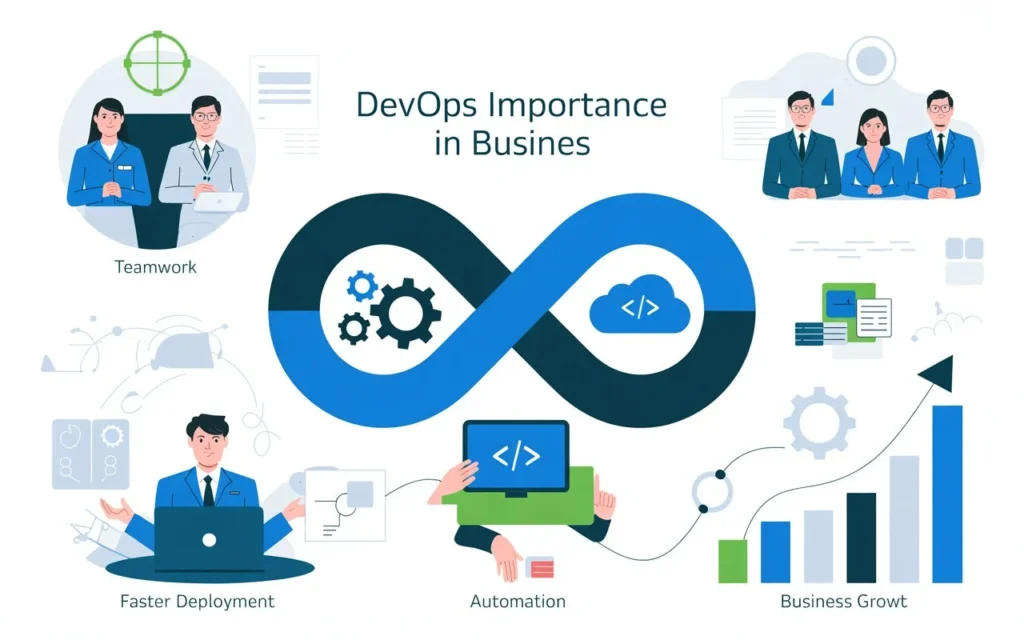Why DevOps is Important for Business
In today’s fast-paced digital economy, businesses can no longer afford long development cycles, disconnected teams, or delayed software releases. The market demands agility, reliability, and the ability to deliver value to customers quickly. This is where DevOps comes in. Far from being a buzzword, DevOps has become a critical framework for modern organizations. It brings together development and operations into a unified approach, transforming the way businesses design, build, and deliver software. Understanding why DevOps is important for business requires looking beyond technology. It is about culture, collaboration, and the ability to adapt in an environment where customer expectations and competitive pressures are constantly evolving
Moving Beyond Traditional IT Silos
In traditional models, software development and IT operations often functioned as two separate entities. Developers focused on building features, while operations teams were responsible for deploying and maintaining them. This created bottlenecks, miscommunication, and frequent delays. DevOps addresses this long-standing divide. By promoting collaboration between developers, testers, and operations staff, businesses gain a unified workflow where code moves smoothly from idea to production. This shift reduces friction, minimizes errors, accelerates delivery and outcomes that are essential in today’s business landscape.

Accelerating Time-to-Market
One of the most practical reasons why DevOps is important is speed. With integrated processes and automation, organizations can move from development to deployment in days rather than months. Automated testing, continuous integration, and continuous delivery pipelines ensures that every piece of code is validated before it reaches production. For businesses, this faster release cycle means quicker responses to market demands, faster delivery of new features, and the ability to seize opportunities before competitors do. In industries like e-commerce, banking, and healthcare, this advantage can directly translate into higher customer satisfaction and increased revenue.
Ensuring Reliability and Stability
Speed alone is not enough if systems fail under pressure. Businesses need reliability. DevOps supports this need through practices such as continuous monitoring, proactive testing, and automated rollbacks. These approaches allow teams to detect issues early and resolve them before they impact end users. By integrating quality assurance into every stage of the development lifecycle, DevOps reduces downtime and ensures stable performance even during peak usage. For organizations that rely on customer trust, such as financial institutions or online service providers, this level of reliability is not just beneficial but it’s non-negotiable.
Building a Culture of Collaboration
Another key reason why DevOps is important for business lies in the cultural transformation it inspires. Instead of working in isolation, teams adopt shared responsibility for both development and operations. Developers understand the impact of their code in real-world environments, while operations teams become active contributors in improving application performance. This shared accountability brings transparency, improves communication, and creates a stronger alignment with business goals. When employees feels motivated to contribute beyond their traditional roles, productivity and innovation rise naturally.
Cost Efficiency Through Smarter Workflows
Businesses constantly look for ways to reduce unnecessary costs without compromising quality. DevOps helps achieve this by minimizing inefficiencies and reducing downtime. Automated testing and monitoring save hours of manual work, while faster deployments reduce the cost of delayed projects. Additionally, detecting and fixing issues early prevents costly failures in production environments. By improving resource utilization and reducing waste, DevOps ensures businesses get more value from their IT investments.
Supporting Scalability and Growth
As businesses expand, IT systems must handle increasing workloads and complex processes. DevOps practices, such as infrastructure as code and automated scaling, make this possible. Organizations can adapt their systems quickly to meet rising demand, ensuring uninterrupted service delivery. This flexibility is particularly valuable for businesses in dynamic industries. Whether a company is expanding into new regions, launching a new digital product, or preparing for seasonal demand surges, DevOps provides the foundation to grow without disruption.
Security as a Core Principle
Cybersecurity is a growing concern for every business. DevOps integrates security into the development cycle through what is often called DevSecOps. Instead of treating security as an afterthought, vulnerabilities are addressed during development, not after deployment. This proactive approach reduces risks, protects sensitive customer data, and ensures compliance with industry regulations. In sectors where data security is critical such as healthcare, finance, and government this is another reason why DevOps is important for business.

Why DevOps Matters for the Future of Business
Ultimately, DevOps is not just about faster software delivery or improved system performance. It is about helping businesses remain adaptable and competitive in a digital-first world. By aligning teams, automating processes, and embedding security into every stage, DevOps creates a strong foundation for innovation and growth. Companies that chooses DevOps position themselves to respond quickly to customer needs, reduce operational risks, and maximize the value of their technology investments. For organizations that want to innovate in the digital era, DevOps is not optional it is essential.
FAQs
- Why is DevOps important for business?
- How does DevOps reduce costs for companies?
- Does DevOps improve security?
- What industries benefit most from DevOps?
- Is DevOps only for large enterprises?
